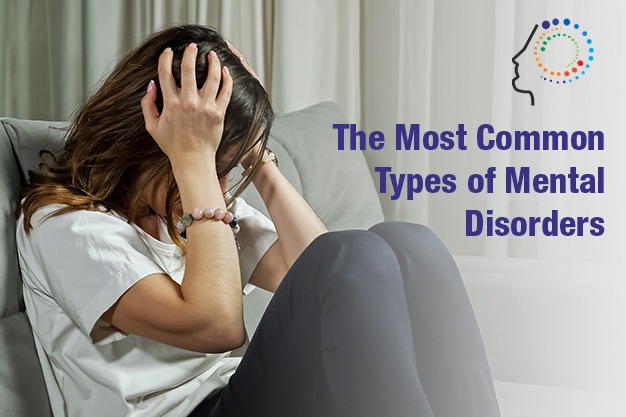Mental health is a term that gives answers to your emotional and psychological well-being. People with strong mental health are known for their ability to face any adversity of life with determination and resilience.
However, in today’s microscopic world, we are prone to uncountable factors that can affect our mental health to varying degrees. Mental health disorders have become a common term in our vocabulary. Illness in our mental health reflects in the individual’s thoughts, moods, and behaviors.
Mental illness is a clinically characterized disorder that projects disturbance in the individual’s cognition, emotional regulation, or behavior. Mental health did not receive the kind of concern as other illnesses with visible symptoms. However, today, people have come to realize the life-threatening impact that weak mental health can have on the life of the patient and the people surrounding them.
This article is, therefore, a medium of awareness familiarizing the reader with the most common type of mental disorder prevailing in the society around us.
Who is at the Risk of Incurring Mental Disorders?
Earlier medical records mentioned the cause of mental health disorders in their patients as being genetic. That is, it was believed that mental illness was a genetic disorder that was transferable from family members. These kinds of illnesses include autism, attention deficit hyperactivity disorder (ADHD), bipolar disorder, severe depression, and schizophrenia.
However, advancements and studies in medicine have unfurled before us that not all mental health problems are genetically based. Some of these are also acquired under adverse circumstances such as poverty, violence, disability, inequality, trauma, and many more.
Most Common Mental Health Disorders
Listed below are some of the most common types of mental illness that individuals are prone to today:
-
Bipolar Disorder
Bipolar Disorder is a chronic mental disease. The main symptom that characterizes this illness is unpredictable mood swings that range from depressive lows to manic highs.
Formerly known as manic depression, Bipolar disorder leaves the individual feeling sad and hopeless or energetic and irritable. The sudden change in mood leads to sleep deprivation, loss of energy, lack of judgment, inability to think properly, and many more. People suffering from bipolar disorder are at an increased risk of committing suicide. Treatments like psychoeducation can help individuals overcome stress and inculcate habits that can help them function as healthy members of society.
-
Schizophrenia
Schizophrenia is a serious mental illness that affects the individual’s ability to interpret reality. The exact cause of schizophrenia remains unknown. However, it is one of those mental health problems that is inherited.
A person suffering from schizophrenia has thoughts that are completely out of touch with their immediate reality. This results in maniac hallucinations, delusions, disordered thinking, and behaviors. It is recorded that the life expectancy of people with Schizophrenia is 10-20 years below the general population. Although there is no definite treatment available for this illness, options like medication, psychoeducation, family interventions, and psychosocial rehabilitation can offer some relief and comfort to the patient.
-
Depression
Depression is a type of mental health disorder that is primarily associated with the person’s mood. The person feels persistent sadness and loss of interest in anything they do. Other symptoms of depression include poor concentration, feelings of excessive guilt, low self-worth, hopelessness, thoughts about death or suicide, insomnia, change in appetite, etc.
Depression can take different forms, such as clinical depression, postpartum depression, persistent depressive disorder, etc. Depression cannot be treated in just a few days or months and requires continuous treatments and consultations.
-
Anxiety Disorder
Anxiety disorder is a mental illness that leaves the individual feeling worried, fearful and anxious most of the time. Individuals with anxiety disorder experience panic attacks, obsessive-compulsive disorder, social anxiety disorder, separation anxiety disorder, and post-traumatic stress disorder. In severe cases, this can cause significant distress and impairment in the individual’s day-to-day functioning.
At present, there are several effective treatments available for anxiety disorder. These treatments are suggested by the physician depending on the nature and severity of the illness.
-
Eating Disorder
An eating disorder is a psychological condition that leads an individual to develop unhealthy eating habits. The two most commonly diagnosed eating disorders are anorexia nervosa and bulimia nervosa. The early signs of the illness include significant distress and impairment of functioning. If left untreated, eating disorders can also result in the death of the person concerned.
Although the eating disorder is mainly labeled to be genetic, there are cases where this is instigated by stress, depression, and societal pressure. There are several treatments available for people suffering from eating disorders. These include Individual, group, or family psychotherapy, medications, and nutritional counseling.
-
Post-Traumatic Stress Disorder (PTSD)
Post-traumatic stress disorder is a mental illness that is inflicted when the person undergoes or experiences some threatening or traumatic experience in the past. PTSD is triggered if the individual finds themselves in similar situations in the present. The individual suffering from PTSD suffers from intrusive memories, flashbacks, or nightmares of the incident. They try to avoid thoughts, memories, activities, places, situations, people, etc., that might trigger them.
These people find it difficult to cope and adjust as they live in constant fear and anxiety. In severe cases, one might also have suicidal thoughts. The treatment for PTSD includes psychotherapy and medications.
Also Read – What Are The 5 Signs of Mental Illness?
Conclusion
Mental health has become a major concern of the present times, where the majority of the adolescent population is diagnosed with depression on a daily basis. The suicide rates have taken a leap because people have failed to realise the life-threatening impact of Mental Health Disorders. With the initial stage being depression, people are slowly being diagnosed with severe conditions like bipolar disorder, eating disorder, etc. Therefore, it becomes very important to become aware and spread awareness of the deadly effects mental illness can have on the lives of people.
From medical consultations to health intervention for anxiety and depression, Dr Anil Yadav, a renowned Psychiatrist, offers assistance in treating major mental illnesses. The consultations and medications provided by Dr Anil Yadav have proved fruitful, comforting, and supportive to many. Therefore, if you or someone close to you is suffering from mental illness, the clinic of Dr Anil Yadav will provide you with the best and most affordable treatment.




Recent Comments